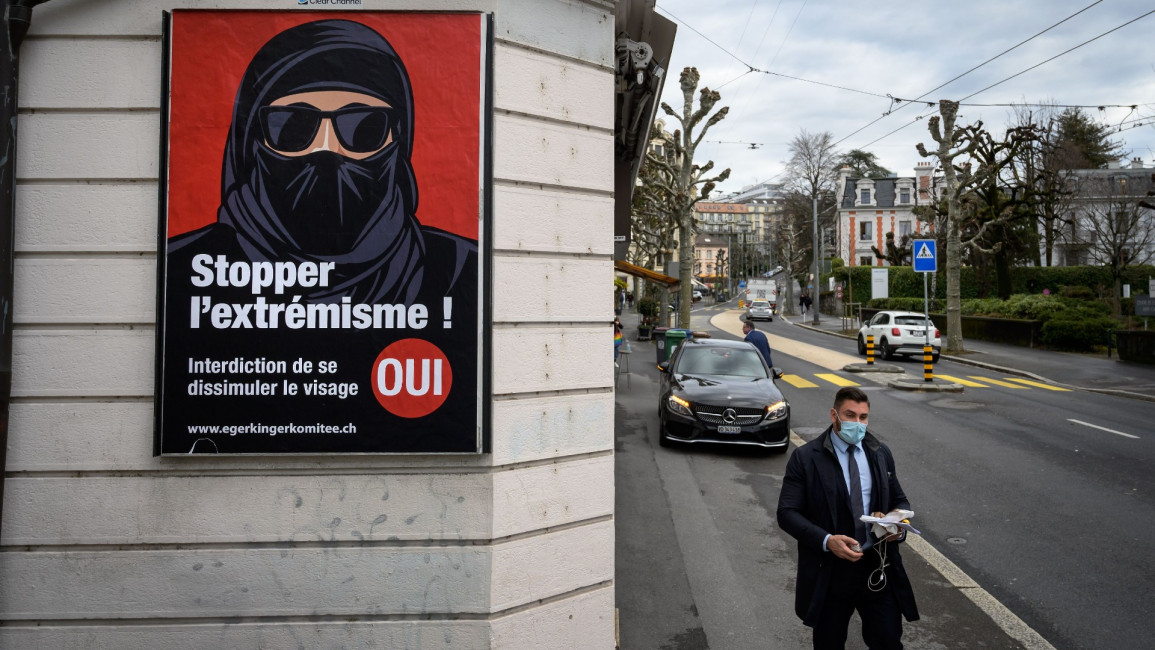
Swiss ban on face coverings reveals a racist and paranoid right-wing
The proposal scraped through in a Swiss referendum on Sunday March 7, with 51.21 percent, amounting to some 1,426,992 people.
Switzerland has joined the growing list of European countries adopting an outright or partial ban of the face veil. Belgium, Italy, Bulgaria, Norway, the Netherlands, Spain, Sweden, Denmark as well as neighbouring France and Austria already have such laws in place.
It is incredible to think that so much political attention is being paid to a religious marker worn by around 30 women in a country of 8.6 million people. As many Muslim women around the world are all too aware, this is of course not about the impacts of the face veil itself on the societies banning them, but rather about a wider shift to the right, and a criminalisation of Muslims across the board.
Walter Wobmann, the chairman of the referendum committee and a member of parliament for the Swiss People's Party, stated that, "in Switzerland, our tradition is that you show your face. That is a sign of our basic freedoms". He highlights in passing that there is a distinction between the liberties of those he considers to make up the country and traditions that should be defended, and Muslims, who clearly don't.
It is easy to target a few dozen women who have already been silenced and demonised through the so-called War on Terror, and who face disproportionate levels of discrimination across society. And yet, political parties and leaders are increasingly finding it is an expedient way to shift attention from their failures and whip up right-wing support.
 |
It is incredible to think that so much political attention is being paid to a religious marker worn by around 30 women |  |
This women's history month, Muslim women stand out - but not in the way that governments and public figures celebrate, and not because they are acknowledged for being strong, brave or pioneering. They are the group in society that is so dehumanised that laws and policies reinforcing their oppression in the workplace, education spaces, health care, government and even in their own homes continue to take centre stage.
Who would have thought our governments had better things to do during a global, deadly pandemic?
The fact that the Swiss referendum was successful while everyone is expected - and in some cases legally obliged- to wear face masks, only adds another layer of duplicity to this attack on Muslim women.
"Today's decision opens old wounds, further expands the principle of legal inequality, and sends a clear signal of exclusion to the Muslim minority," explained the Central Council of Muslims in Switzerland.
Twitter Post
|
Taken in the context of the far-right momentum that continues to grow across the continent, the Swiss vote shows that this is not only a problem created by groups of thugs preaching violence and hatred on our streets. The oppression of Muslims is becoming enshrined in the laws of the land.
Furthermore, the gendered elements of these Islamophobic policies and campaigns, including the new "separatism law" in France - are hard to ignore.
Read more: Swiss voters narrowly back Muslim 'burqa ban'
The dominant and contradictory depiction of Muslim women is that they are both victims and perpetrators of violence: The Muslim woman has no agency because brown and black Muslim men supposedly repress their women and render them submissive objects. At the same time, when she asserts herself by opposing such tropes, she is ignored - assumed to be too uneducated or open minded to consciously seek her rights and freedoms. Therefore, the state must - as the old colonial mission goes - step in and "save her".
In parallel, her assumed conservative religious views - while they are seen as the outcome of a Muslim patriarchy which has brainwashed her - make her a dangerous force for potentially radicalising children at home.
This pattern, common to all nations who participate in the War on Terror, only reinforces that our resistance should also be global. Muslims as well as all those who are worried about the normalisation and institutionalising of Islamophobia should be building bridges internationally to learn from each other, develop common responses, and share campaigns.
This is especially important given the links between the targeting of Muslims through counter-extremism measures, and the curtailing of everyone's civil liberties.
The ban in Switzerland even includes bandanas and ski masks in public places, though there are exceptions for activities deemed sufficiently Swiss, such as skiing and carnival. This is not random, demonstrators from movements like Extinction Rebellion often wear these forms of face coverings during protests, and given the crackdown following the considerable momentum gained by such movements over the last few years, the intention of the ban is clear.
 |
The oppression of Muslims is becoming enshrined in the laws of the land. |  |
This makes the need for an immediate, broad coalition of opposition all the more important. After all, the policy shouldn't be accepted as final. Just under half of Swiss voters were opposed to it. That means that there are hundreds of thousands of people who are against the racist practice, which is a pretty big base to mobilise alongside.
It is hard, these days, not to feel like fascists, racists, and Islamophobes are winning everywhere. That might be true for now, but it is up to us to organise around the conviction that things can be changed, reversed and transformed.
The only way to strengthen our defence, is to unite the many different struggles that arise around us, and develop collective forms of resistance, and visions of a different and better world. That way, perhaps next year, we'll be able to truly celebrate our collective achievements during women's history month.
Malia Bouattia is an activist, a former president of the National Union of Students, and co-founder of the Students not Suspects/Educators not Informants Network.
Follow her on Twitter: @MaliaBouattia
Have questions or comments? Email us at: editorial-english@alaraby.co.uk
Opinions expressed here are the author's own, and do not necessarily reflect those of her employer, or of The New Arab and its editorial board or staff.




